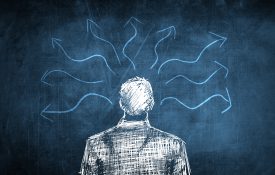-

Who Is That? The Study of Anonymity and Behavior
A rich body of research has suggested that people have a tendency to behave rudely and abusively when their identities are concealed, but recent studies have identified the positive features of anonymous interactions.
-

Why ‘Sorry’ Seems to Be the Hardest Word
Offenders may not apologize if they have little concern for the victim, if they perceive a threat to their positive self-image, or if they predict that their apology won’t be effective.
-
Fine-Tune Your B.S. Detector: You’ll Need It
Do you have a good B.S. detector? You need one in our digital age. The skill of spotting false information—rubbish, nonsense and, yes, fake news—is so important these days that scientists have begun serious research
-

How Reciprocity Can Magnify Inequality
A series of studies show that people tend to reciprocate others’ actions in ways that increase disparities in wealth.
-

Why Bad News Compels Us to Take Action
How people handle sunk costs may depend, at least in part, on whether pursuing a new course of action is framed as the more active or inactive option.
-

Studies in Swollen Heads: What Causes Overconfidence?
A set of experiments demonstrates how people can underestimate or forget about the importance of practicing an activity in order to do it well.

